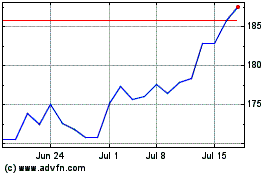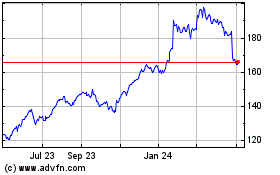By Ted Greenwald
This article is being republished as part of our daily
reproduction of WSJ.com articles that also appeared in the U.S.
print edition of The Wall Street Journal (January 19, 2018).
International Business Machines Corp. reported higher revenue
for the first time in 23 quarters and signaled continued growth
into 2018, giving Chief Executive Ginni Rometty breathing space as
she tries to turn around the century-old tech giant.
Fourth-quarter revenue rose 3.6% to $22.54 billion. The last
time IBM had revenue growth from the prior year was the first
quarter of 2012, Ms. Rometty's first as chief.
Several factors drove growth in the latest quarter: sales of
industrial-strength computers -- which the company typically
refreshes every few years -- rose 32% to $3.33 billion, while
cloud-computing revenue climbed 30% to $5.5 billion. Also, currency
exchange rates have been working in IBM's favor lately, accounting
for 3 percentage points of the quarter's revenue growth after years
of being a headwind.
IBM said it took a $5.5 billion charge related to the new U.S.
tax law, helping to push it into the red for the period. Its tax
rate, excluding the charge but including certain one-time benefits,
was 6%.
In all, the company reported a fourth-quarter loss of $1.05
billion, or $1.14 a share, compared with profit of $4.5 billion, or
$4.72 a share, a year earlier.
The loss stemmed partly from a deep erosion in profits in IBM's
services business, showing IBM still has work to do. Pretax profit
margins in the two services segments that manage large companies'
software and hardware needs sank 35% and 23%, respectively, from a
year ago. In its conference call with analysts, IBM described high
investments and "large contract dynamics" in those businesses.
Since becoming CEO, Ms. Rometty has struggled to shift IBM from
older, shrinking businesses, such as selling and maintaining
equipment in customers' own facilities, to newer ones that promise
rapid growth.
She has staked out a position in helping large corporate
customers integrate their traditional operations with cloud
computing, and has focused on buzzy areas such as artificial
intelligence and the Internet-based ledger technology known as
blockchain.
But growth has been elusive, as even high-profile initiatives --
such as IBM's Watson AI, a collection of cloud tools as well as
apps for industries including medicine and finance -- haven't
delivered a clear financial boost.
Even some of Ms. Rometty's biggest fans have lost patience.
IBM's largest and arguably most prominent stakeholder -- Warren
Buffett's Berkshire Hathaway Inc., which invested more than $10
billion for a 5.4% stake in 2011 -- sold more than half its
holdings last year. Berkshire held about 37 million shares as of
Sept. 30.
Shares of the 106-year-old tech company dropped 3.1% in
after-hours trading after finishing Thursday's regular session with
a marginal gain at $169.12. The price stands roughly where it did a
year ago, while the S&P 500 index has risen more than 23%.
While achieving quarterly growth is noteworthy, IBM is working
toward what it sees as a more significant milestone: getting more
than half its revenue from so-called strategic imperatives --
mostly newer technologies such as AI that customers can access in
the cloud.
Revenue from strategic imperatives made up 49% of the total in
the quarter, edging toward the point at which sales of the
higher-growth offerings will outweigh the rest of IBM, heralding
faster growth overall.
In an interview, James Kavanaugh, IBM's new finance chief, said
the company is "ahead of track" in working toward its goal of
hitting an annual revenue rate of $40 billion for strategic
imperatives by the end of this year.
"That gives us the confidence to say we're going to grow revenue
overall in 2018," he said.
Jim Lebenthal, a portfolio manager at HPM Partners LLC, said
there is evidence of Ms. Rometty's progress. He shed IBM in 2015
after "a lot of disappointments" but recently added the company to
his stable of 20 stocks. He is betting IBM's newfound revenue
growth is sustainable and that strategic imperatives will grow to
more than 50% of sales in 2018.
When Ms. Rometty took the CEO reins from Samuel Palmisano in
January 2012, revenue started slipping almost immediately and the
threat of cloud computing to IBM's traditional businesses became
evident. Ms. Rometty purchased cloud-computing platform SoftLayer
Technologies Inc. the following year and committed to developing
Watson into a flagship offering.
By 2014, it was clear IBM had diverged from Mr. Palmisano's
financial road map for $20-a-share in profit by 2015. Ms. Rometty
set aside that goal, reorganized the company around her strategic
imperatives and redirected about $4 billion away from stock
repurchases toward priorities such as Watson and the cloud,
according to UBS AG analyst Steven Milunovich.
IBM's challenges now include holding on to its large customers
as cloud leaders such as Amazon.com Inc., Microsoft Corp. and
Alphabet Inc.'s Google beckon.
"Strategic imperative revenue may cross over the core franchises
later this year," Mr. Milunovich said, "but there are a lot of
industry trends working against a large incumbent like IBM."
Hardware revenue rose 32%, driven by sales of mainframe
computers -- on IBM's conference call with analysts, former finance
chief Martin Schroeter called mainframes "an enduring and growing
franchise" -- which accounted for nearly 15% of total revenue in
the quarter.
Those sales are critical, as they drive related sales of support
services, software, storage and financing that historically have
made up roughly 40% of IBM's operating profit, according to analyst
Toni Sacconaghi of Bernstein Research. They also can cement
long-term customer relationships that drive recurring revenue such
as software subscriptions, he said.
On an adjusted basis, which omits such items as acquisition- and
retirement-related charges, IBM had profit of $5.18 a share, a
penny more than the $5.17 expected by analysts, according to
Thomson Reuters.
The Armonk, N.Y., company's guidance for 2018 called for
operating earnings of $13.80 a share and free cash flow of about
$12 billion.
Write to Ted Greenwald at Ted.Greenwald@wsj.com
(END) Dow Jones Newswires
January 19, 2018 02:47 ET (07:47 GMT)
Copyright (c) 2018 Dow Jones & Company, Inc.
International Business M... (NYSE:IBM)
Historical Stock Chart
From Mar 2024 to Apr 2024

International Business M... (NYSE:IBM)
Historical Stock Chart
From Apr 2023 to Apr 2024
